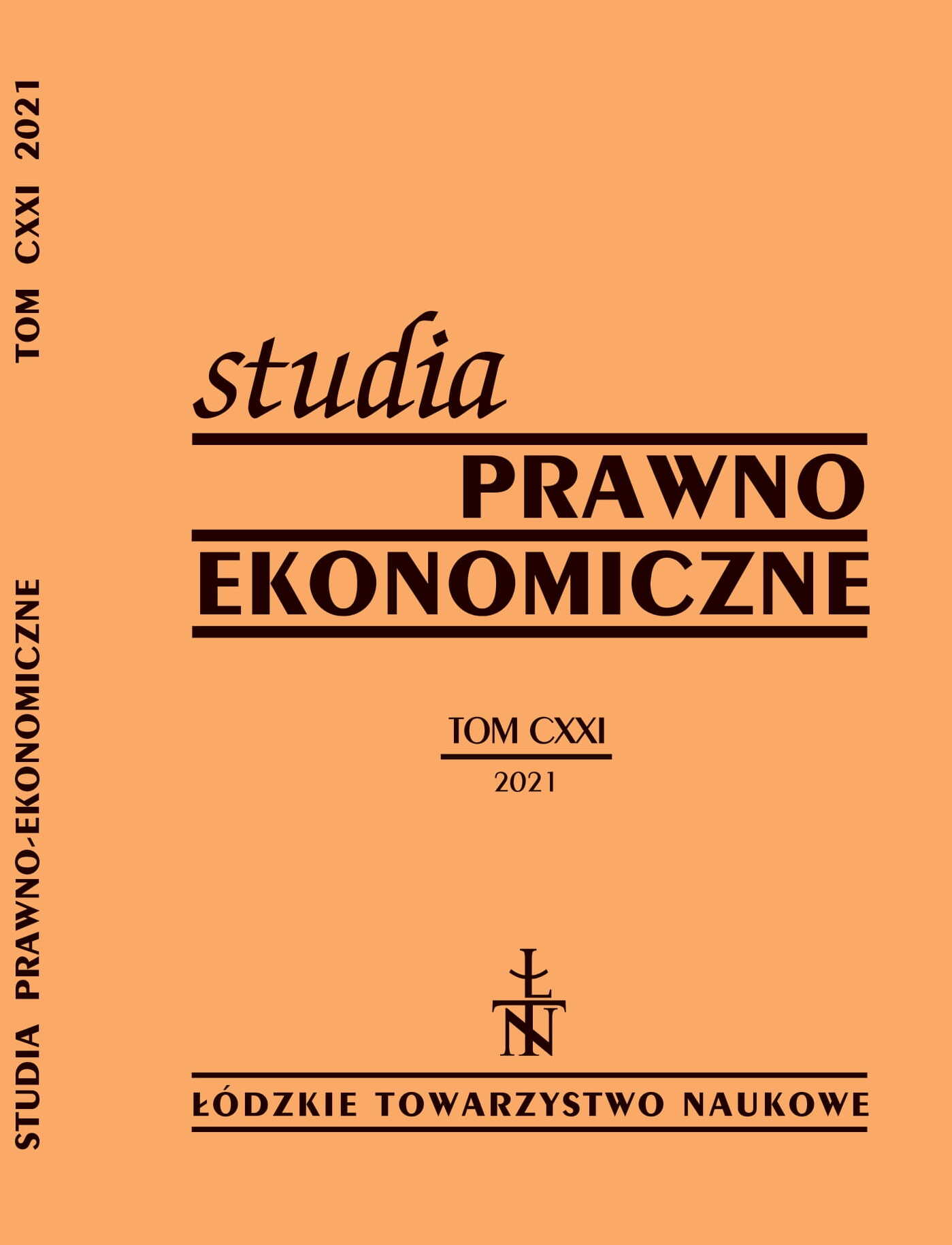Notes on the legal nature of the consortium
DOI:
https://doi.org/10.26485/SPE/2021/121/2Keywords:
consortium, civil law partnership, joint property, consortium leader, companiesAbstract
Background: Subject matter of this work is legal nature of consortium contract. This problem is important, as consortium is rather popular in Poland as a form of cooperation between entrepreneurs, but is it has no regulation in any legal act (situation is similar in many other legal systems). In our doctrine there are only few works on consortium, but it may be seen as an important problem in several judicial decisions of the Supreme Court of Poland.
Research purpose: The scope of this work is to recognize whether consortium is just a form of civil law partnership or may be treated as a distinct contract of cooperation between entrepreneurs. In case of the latter, it is necessary to explain its legal nature.
Methods: Analyzing the doctrine (not very rich in case of consortium) and court decisions (with stable and precise idea of consortium contract) leads to the conclusion that a consortium is a contract of cooperation, distinct from civil law partnership. It was also necessary to undertake some analysis on the nature of partnership and company in Polish law.
Conclusions: In effect, a consortium should be treated as a form of professional cooperation, with no legal personality and no joint property. Consortium as a contract fulfills different needs of entrepreneurs compared to partnership or company. It differs from civil partnership as members of consortium do not act like partners, but rather act independently and gain their own profits. There are no profits for the whole consortium to be divided between participants. In a consortium, members are usually acting one after the other so it is necessary to appoint one of them as a coordinator, called “leader of the consortium”. The leader acts as an agent for other participants. In Polish law the consortium is a well known and a frequently used legal construction, nonetheless its scheme and models are quite different in different economical situations. It leads to the conclusion that it is still not possible to create any formal regulation for this contract.
Downloads
References
Ustawa z 23.04.1964 r. Kodeks cywilny, t.j. Dz.U. z2020 r., poz. 1740.
Ustawa z 29.08.1997 r. Prawo bankowe, t.j. Dz.U. z2020 r., poz. 1896.
Ustawa z 15.09.2000 r. Kodeks spółek handlowych, t.j. Dz.U. z2020 r., poz. 1526.
Ustawa z 29.01.2004 r. Prawo zamówień publicznych (nieob.), t.j. Dz.U. z2019 r., poz. 1843.
Ustawa z 27 sierpnia 2004 r. oświadczeniach opieki zdrowotnej finansowanych ze środków publicznych t.j. Dz.U. z2021 r., poz. 1285.
Ustawa z 27.04.2006 r. o spółdzielniach socjalnych, t.j. Dz.U. z2020 r., poz. 2085.
Ustawa z 30.04.2010 r. o zasadach finansowania nauki (nieob.), t.j. Dz.U. z2018 r., poz. 87.
Ustawa z 11.09.2015 r. o działalności ubezpieczeniowej i reasekuracyjnej, t.j. Dz.U. z2021 r., poz.1130.
Ustawa z 11.09.2019 r. Prawo zamówień publicznych, t.j. Dz.U. z2021 r., poz. 1129.
Herbet A., Spółka cywilna, w: A. Szajkowski (red.), System Prawa Prywatnego, t. 16, Warszawa 2008, s.463–749.
Juchniewicz E., Kruczalak-Jankowska J., Maśniak D. (red.), Consortia in Central and Eastern Europe, Gdańsk 2019.
Katner W.J., Umowy nienazwane, w: W.J. Katner (red.), System Prawa Prywatnego, t. 9, Warszawa 2018, s. 6–25.
Lic J., Spółka cywilna. Problematyka podmiotowości prawnej, Warszawa 2013.
Muchowska-Zwara K., Prawne problemy funkcjonowania konsorcjów uczestniczących w obrocie regulowanym przez Prawo zamówień publicznych, Warszawa 2015.
Opalski A., Umowa konsorcjum, w: W.J. Katner (red.), System Prawa prywatnego, t. 9, Warszawa 2016, s. 1189–1201.
Radwański Z., Rodzaje czynności prawnych, w: Z. Radwański (red.), System Prawa Prywatnego, t. 2, Warszawa 2002, s. 245–303.
Romanowski M., Umowa spółki, w: A. Szajkowski (red.), System Prawa Prywatnego, t. 16, Warszawa 2008, s. 85–191.
Skubiszak-Kalinowska I., Wiktorowska E., Prawo zamówień publicznych. Komentarz do art.23 uzp., LEX 2017.
Stecki L., Konsorcjum, Toruń 1997.
Włodyka S., Prawo spółek, Kraków 1996.
Postanowienie SN z 6.03.2015 r., III CZP 113/14, LEX 1733674.
Postanowienie SN z 16.05.2018 r., ICSK 14/18, LEX 2488076.
Wyrok NSA z9.12.2016 r., II GSK 2695/16, LEX 2237909.
Wyrok SN z9.07.2015 r., ICSK 353/14, LEX 1765999.
Wyrok SN z6.07.2018 r., II CSK 562/17, LEX 2518909.
Wyrok SN z16.10.2019 r., II CSK 710/18, LEX 2729314.
Downloads
Published
How to Cite
Issue
Section
License
Copyright (c) 2021 Łódzkie Towarzystwo Naukowe

This work is licensed under a Creative Commons Attribution 4.0 International License.



